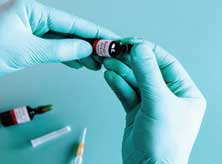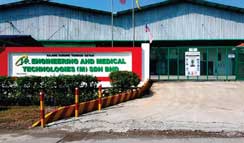A secure supply of gloves and new designs of antimicrobial gloves go hand-in-hand to stave off the health crisis facing countries around the globe, says Angelica Buan in this report.
All it takes is a pair of gloves, a critical factor to preventing transmission of infections and saving lives, as seen during the recent global coronavirus crisis. Gloves are effective devices to reduce the risk of contamination from blood and other body fluids for healthcare workers and frontliners. They also aid in reducing the risk of microbial spread, acquiring infections, or passing on pathogenic agents from one person to another.
Thus, it is not surprising that the market for medical rubber gloves has expanded and is forecast to fetch US$70 billion by 2027, according to a report by Global Industry Analyst.
During the initial months into the pandemic last year, demand for medical gloves soared and outpaced supply, with the World Health Organisation (WHO) urging for a secure supply of personal protective equipment (PPE), including gloves. It approximated that 76 million units/month of gloves were required for response to the Covid-19 pandemic.
New glove players heed the call
In March 2020, WHO alerted the global PPE industry and governments to make sure that the provision for PPEs would be met and then recommended increasing production of PPEs by 40% to meet the rising global demand.
During the pandemic, amid factory shutdowns, halved workforces, reduced production capacities and stalled deliveries, demand for gloves continued to surge. Fortunately, new glove producers have sprouted to fill the supply gap.
In December last year, Australia-headquartered Ansell formed a long-term supply partnership with Indian gloves maker Primus Gloves, acquiring its life sciences business. Ansell, which has operations in North America, Latin America/Caribbean, EMEA and Asia Pacific and customers in more than 100 countries worldwide, expects the acquisition to increase its presence in India, which it describes as a fast growing pharmaceutical hub.
As the world’s biggest producer of rubber gloves, Malaysia contributes more than 60% of global supply. Thus, it is not surprising that more glove makers are entering the market in Malaysia. The most recent is Salcon Berhad’s subsidiary, Nusantara Jasakita (NJSB) that acquired a 51% stake in glove producer JR Engineering and Medical Technologies (JR) for RM28 million.
JR, admitting that it was operating beyond its capacity at the time, has a production of over 336 million gloves/ year from four single-former production lines in its factory located in Zurah Industrial, Hulu Selangor.
To meet the high demand in specific export markets, JR had to increase production capacity by an additional 12 lines to a total of 16 production lines within one year at an estimated capital expenditure of RM150 million, to be funded via internally generated funds and bank borrowings. Once completed, total production capacity will become 3 billion gloves/year. JR is targeting to export to the US, European markets and other countries.
The acquisition will allow Salcon immediate access to a trained labour force, existing customers and an immediate source of revenue whilst cutting down on lengthy product approvals and registration processes, Salcon intoned in a statement. It added that while other manufacturers are working double-time to ramp up production capacity, and new companies are venturing into gloves production, “a structural change in usage of gloves will ensure there is continued and strong demand in the market in the near to midterm”.
Similarly, Malaysian tyre retreading company GIIB is reportedly going into gloves manufacturing through its subsidiary GIIB Healthcare Products. In this venture, GIIB is planning to install five double-formers gloves production lines with an estimated production capacity of over 1 billion pieces of gloves/year. The production lines are expected to start up in December 2021.
Virus be gone with antibacterial gloves
An effective barrier against highly contagious pathogens, healthcare workers and frontliners cannot do without medical gloves. WHO, however, cautioned against complacency in using gloves because they do not provide complete protection against contamination. WHO has explained that pathogens can contaminate the caregivers’ hands via small defects in gloves, or during removal of the gloves.
While basic, although effective safeguards are recommended such as hand hygiene by washing, new advances in gloves can assure the needed extra protection.
US-based company GHS, which develops and produces technical hand wear, launched what it said is a sustainable glove solution offering protection against bacteria and microbes. According to GHS, the BlocAid gloves with antimicrobial and antibacterial barrier are specially designed and engineered with the patented EcoZinc, which is directly embedded into the fibre through an extruded yarn manufacturing process that gives BlocAid gloves self-cleaning properties, inhibit growth of harmful microbes, and that enable the gloves to be re-used and washed multiple times without losing efficacy.
GHS said that EcoZinc is generally safe (according to the FDA) and can be ingested, and safely applied topically. The gloves are protective on all levels and are rated UPF 50+ (with an actual rating of 99.996% UVA/UVB 100% protection) daily usage, it added. The US-manufactured BlocAid seamless knit gloves are also touch screen compatible.
Another US-based firm, Goldshield Technologies, developed its Goldshield 5, which when applied to medical masks and gloves can reduce Covid-19 exposure for up to three days
Goldshield Technologies first introduced the antimicrobial technology in 2009 to protect users against hospital-acquired-infections (HAI’s). With the Covid-19, Goldshield Technologies is again offering this solution to fight off virus spread.
The patented Goldshield 5 underwent independent testing in a study sponsored by Chinese medical mask and glove manufacturer Guilin HBM Health Protections. The study found that Goldshield 5 when applied to PPEs created a residual protective bio-barrier on treated medical masks and rubber medical gloves against the Covid-19 virus. It was found to be effective in killing the Covid-19 virus, and to provide protection for a maximum of 72 hours.
On the surgical masks treated with Goldshield 5, the Covid-19 inactivation rate was 99.88% kill rate compared to the control group, with a residual kill rate observed by the researchers for a period of three days. The Goldshield 5 treatment on the medical gloves resulted in the inactivation of the Covid-19 virus at a kill rate of 94.87% compared to the control group, Goldshield Technologies said.
It informs that more than 50 independent studies, including three, peer-reviewed, studies published in the American Journal of Infection Control, were conducted to ensure the efficacy of Goldshield 5.
Finnish glove maker Hofler Oy has developed a glove with a natural-based treatment that eliminates viruses and bacteria by 99%. The company said that the Hofler Biotech UT gloves with protective function are just as timely now that countries are dealing with the Covid-19 virus.
The thin and shape-fitted knitted glove is treated with a non-toxic antimicrobial that is derived from sidestreams of the forest industry. It is applied on the inside and outside of the glove.
Designed for everyday use, the gloves are reusable, and can be worn indoors and outdoors. The gloves can be machine washed up to 30 times without losing their antimicrobial properties, Holfer said.




